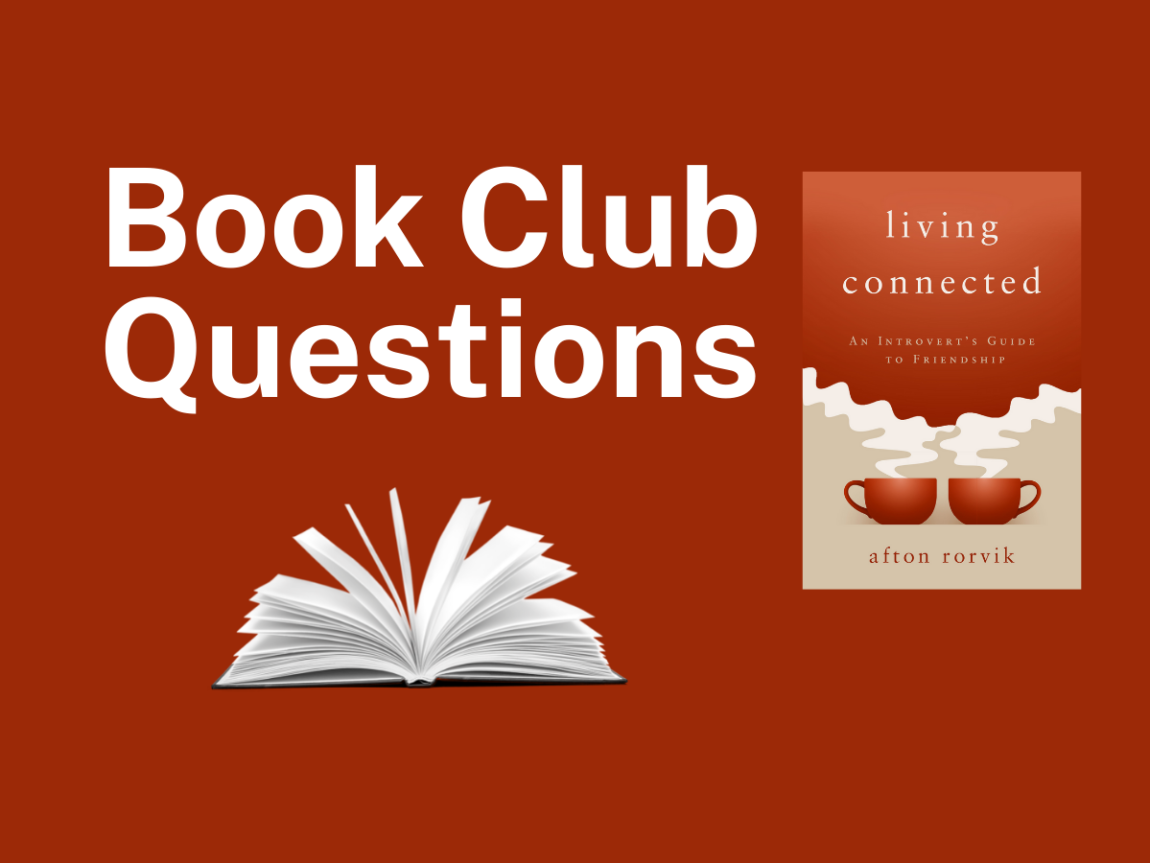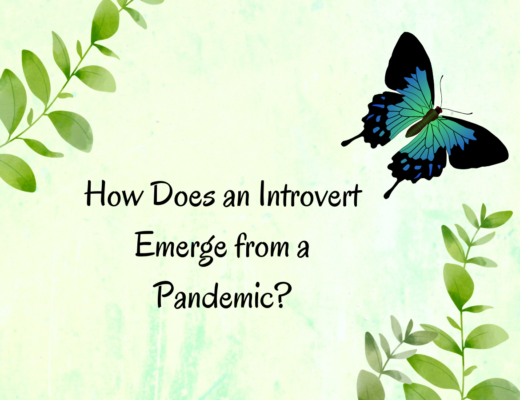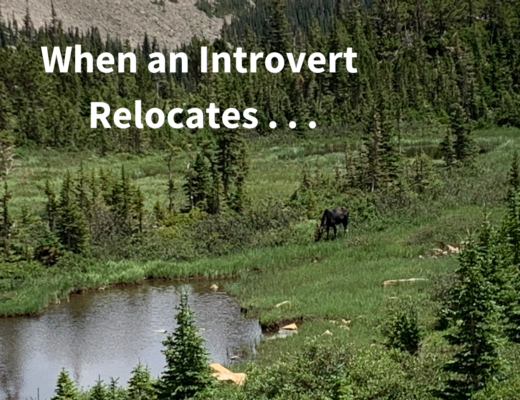Six-Week Book Discussion
Week 1: Introduction, Preface, Chapter 1 (Honesty)
- How would you describe yourself: introvert, extrovert, ambivert (a bit of both)? Why?
- How did your family of origin describe you as a child? Have you changed? How? Why?
- What prompted you to read this book now? What do you hope to gain from this discussion?
- What did you think when you read the introduction and preface? What do they tell you about the author’s bias?
- What did you expect in a chapter about honesty in friendships? What surprised you?
- What story did you like most in this chapter? Why?
- What story of your own could fit into this chapter? (Bonus points if your story includes an introvert/extrovert twist.)
- On a scale of 1 (a definite struggle) to 10 (a natural tendency) how do you rate yourself with this trait of honesty? Why?
- How do you respond to this quotation from page 35:
Self-awareness helps us say, I can do this in my own unique, introverted way, rather than saying, This just feels too hard. Why bother?
- How do you typically react to someone who takes an honest, self-revelatory step toward you?
- How do you think building a self-revelatory relationship with God could affect your face-to-face relationships?
- What journaling question at the end of this chapter stood out to you? Why?
- What do you wish this chapter had covered?
Week 2: Chapter 2 (Generosity) and Chapter 3 (Approachability)
Chapter 2: Generosity
- What did you expect in a chapter about generosity in friendships? What surprised you?
- On a scale of 1 (a definite struggle) to 10 (a natural tendency), how do you rate yourself with this trait of generosity? Why?
- What story did you like most in this chapter? Why?
- What story of your own could fit into this chapter? (Bonus points if your story includes an introvert/extrovert twist.)
- How do you respond to this quotation from page 45?
Sometimes we introverts can slip easily into a giver-all-the-time role. Because we listen well, we see need. And our creative minds love to find ways to mee those needs. But if we return to the idea of living openhanded, that means we must not hug our own need to ourselves, hiding it from others.
- What do you think of the story from Mark 2 about the five men who help their friend find healing?
- What journaling question at the end of this chapter stood out to you? Why?
- What do you wish this chapter had covered?
Chapter 3: Approachability
- What did you expect in a chapter about approachability in friendships? What surprised you?
- On a scale of 1 (a definite struggle) to 10 (a natural tendency), how do you rate yourself with this trait of approachability? Why?
- What story did you like most in this chapter? Why?
- What story of your own could fit into this chapter? (Bonus points if your story includes an introvert/extrovert twist.)
- What do you think about the story of Jesus at the well (John 4)? What does it say to you about practicing approachability and reaching across cultures and gender barriers?
- How does noticing body language cues help you connect with people? What body language cues help you most?
- How do you respond to these words from page 75?
We all want things equal in relationships, especially in terms of effort, don’t we? What if we stopped keeping score and simply adopted Shasta’s Imitator Mantra or developed a simple Introverted Initiator Mantra of our own, such as, I will initiate one connection every week (or month) with a friend or a potential friend?
- What journaling question at the end of this chapter stood out to you? Why?
- What do you wish this chapter had covered?
Week 3: Chapter 4 (Curiosity) and Chapter 5 (Empathy)
Chapter 4: Curiosity
- What did you expect in a chapter about curiosity in friendships? What surprised you?
- On a scale of 1 (a definite struggle) to 10 (a natural tendency), how do you rate yourself with this trait of curiosity? Why?
- What story did you like most in this chapter? Why?
- What story of your own could fit into this chapter? (Bonus points if your story includes an introvert/extrovert twist.)
- How do you respond to the idea of preparing questions for social situations? Have you tried it? Does it work for you? Got a favorite question?
- What do you make of the fact that Jesus often “taught” by asking questions (Matthew 5:13, Matthew 6:27)?
- What do you think of this Introvert Challenge on page 93?
Set up one of Brain Grazer’s “Curiosity Conversations” with someone you have admired from afar. Rather than asking for an hour, suggest a shorter time, maybe thirty minutes, over a cup of coffee. And bring a notebook and pen with you to take notes and give yourself an eye-contact breather. Come with a few nonthreatening questions related to employment, location, family, friends, or favorite food.
- What journaling question at the end of this chapter stood out to you? Why?
- What do you wish this chapter had covered?
Chapter 5: Empathy
- What did you expect in a chapter about empathy in friendships? What surprised you?
- On a scale of 1 (a definite struggle) to 10 (a natural tendency), how do you rate yourself with this trait of empathy? Why?
- What story did you like most in this chapter? Why?
- What story of your own could fit into this chapter? (Bonus points if your story includes an introvert/extrovert twist.)
- Do you think empathy comes more naturally for an introvert than for an extrovert? Why?
- How do you respond to this quotation (page 102) about the practice of taking your emotional temperature throughout the day?
Over the last few years, I’ve begun a practice of taking my emotional temperature throughout the day—more challenging than I realized. Do I feel overwhelmed, anxious, inadequate, frustrated, angry, excited, energized? Why? Instead of trying to shove aside those emotions, I try to greet them and understand them almost as if they appeared in a math textbook.
This process has given me more bandwidth for empathy because it alerts me when I have overstepped my abilities to carry other people’s emotions.
- The biblical story of Nehemiah illustrates the strong combination of prayer and empathy. How do you think that combination could work in our modern times, especially in the arena of friendship?
- What journaling question at the end of this chapter stood out to you? Why?
- What do you wish this chapter had covered?
Week 4: Chapter 6 (Loyalty) and Chapter 7 (Confidentiality)
Chapter 6: Loyalty
- What did you expect in a chapter about loyalty in friendships? What surprised you?
- On a scale of 1 (a definite struggle) to 10 (a natural tendency), how do you rate yourself with this trait of loyalty? Why?
- What story did you like most in this chapter? Why?
- What story of your own could fit into this chapter? (Bonus points if your story includes an introvert/extrovert twist.)
- How do you respond to this quotation from page 121?
Loyalty: rather than talking to someone else about something another person did to hurt me, I will talk directly to that person.
- What do you think of trying to implement the Matthew 18:15 principle in relationships?
If your brother or sister sins, go and point out their fault, just between the two of you. If they listen to you, you have won them over.
- What journaling question at the end of this chapter stood out to you? Why?
- What do you wish this chapter had covered?
Chapter 7: Confidentiality
- What did you expect in a chapter about confidentiality in friendships? What surprised you?
- On a scale of 1 (a definite struggle) to 10 (a natural tendency), how do you rate yourself with this trait of confidentiality? Why?
- What story did you like most in this chapter? Why?
- What story of your own could fit into this chapter? (Bonus points if your story includes an introvert/extrovert twist.)
- How do you respond to this quotation (page 137) from author Joseph Epstein?
I cannot condemn gossip, at any rate not with a good conscience if only because I enjoy it too heartily even while I understand that too much of it lowers the tone of any society . . .
- What do you think of the SAR gossip vaccine (Stick to the facts; Avoid names and juicy tidbits; Refuse to speculate)? How might you have responded differently to situations this week if you had had the SAR gossip vaccine?
- Ephesians 4:29 (NIV) challenges: “Do not let any unwholesome talk come out of your mouths, but only what is helpful for building others up according to their needs, that it may benefit those who listen.” How do you respond to that challenge?
- What journaling question at the end of this chapter stood out to you? Why?
- What do you wish this chapter had covered?
Week 5: Chapter 8 (Consistency) and Chapter 9 (Flexibility)
Chapter 8: Consistency
- What did you expect in a chapter about consistency in friendships? What surprised you?
- On a scale of 1 (a definite struggle) to 10 (a natural tendency), how do you rate yourself with this trait of consistency? Why?
- What story did you like most in this chapter? Why?
- What story of your own could fit into this chapter? (Bonus points if your story includes an introvert/extrovert twist.)
- What do you think of the story of Daniel and his three friends and veggies?
- How do you respond to this quotation (pages 158-159) from author James Clear? Got some habit-stacking tips of your own that you help you build friendships?
One of the best ways to build a new habit is to identify a current habit you already do each day and then stack your new behavior on top.
- What words would you include in your life theme? Why? What value have you found in creating such a statement for yourself?
- What journaling question at the end of this chapter stood out to you? Why?
- What do you wish this chapter had covered?
Chapter 9: Flexibility
- What did you expect in a chapter about flexibility in friendships? What surprised you?
- On a scale of 1 (a definite struggle) to 10 (a natural tendency), how do you rate yourself with this trait of flexibility (in the physical realm and in the emotional realm)? Why?
- What story did you like most in this chapter? Why?
- What story of your own could fit into this chapter? (Bonus points if your story includes an introvert/extrovert twist.)
- How do you respond to this quotation found on page 182?
Sometimes we introverts can let our voice get lost in the din of others’ voices . . . . We become so flexible that we no longer live consistently as ourselves. We lose our voice—literally and figuratively.
- How do you respond to the story of Abraham, who went when and where God asked him to go even when he did not have precise details about that journey?
- What journaling question at the end of this chapter stood out to you? Why?
- What do you wish this chapter had covered?
Week 6: Chapters 10 (Creativity), Chapter 11 (Hospitality), and Chapter 12 (Humility)
Chapter 10: Creativity
- What did you expect in a chapter about creativity in friendships? What surprised you?
- On a scale of 1 (a definite struggle) to 10 (a natural tendency), how do you rate yourself with this trait of creativity? Why?
- What story did you like most in this chapter? Why?
- What story of your own could fit into this chapter? (Bonus points if your story includes an introvert/extrovert twist.)
- Who do you know who does a good job of infusing creativity into friendships? What have you observed?
- The biblical story of Ruth and Naomi beautifully describes some unique friendship that grew among in-laws, across generations, and bridging cultures. How do you respond to this story? What challenges you about it? What inspires you?
- How do you respond to this introvert challenge found on page 205?
Think about some of the creative ideas you have rolling around in your head. Take one of these ideas and develop a plan to share it with a friend or friend-to-be. How might your friend collaborate with you on the project?
- What journaling question at the end of this chapter stood out to you? Why?
- What do you wish this chapter had covered?
Chapter 11: Hospitality
- What did you expect in a chapter about hospitality in friendships? What surprised you?
- On a scale of 1 (a definite struggle) to 10 (a natural tendency), how do you rate yourself with this trait of hospitality? Why?
- What story did you like most in this chapter? Why?
- What story of your own could fit into this chapter? (Bonus points if your story includes an introvert/extrovert twist.)
- What do you think about the idea of out-of-the-house hospitality?
- How do you respond to this quotation (pages 209-210), based on the story of Elijah and the widow at Zarephath as told in 1 Kings 17:8-16?
Perhaps this widow needed the visual, daily reminder that when you honor God and love the people He brings across your path you will always have enough, Enough food Enough time. Enough energy.
- What do you think about the hospitality hacks for introverts listed on pages 213-216? What would you add or subtract?
- What journaling question at the end of this chapter stood out to you? Why?
- What do you wish this chapter had covered?
Chapter 12: Humility
- What did you expect in a chapter about humility in friendships? What surprised you?
- On a scale of 1 (a definite struggle) to 10 (a natural tendency), how do you rate yourself with this trait of humility? Why?
- What story did you like most in this chapter? Why?
- What story of your own could fit into this chapter? (Bonus points if your story includes an introvert/extrovert twist.)
- How do you define humility? What about humility in relationships?
- Take a few minutes to read aloud Philippians 2:1-4 as printed on page 227. What do you think of this advice? Any practical suggestions about implementing it?
- How do you respond to this quotation found on page 229?
As I’ve written in almost every chapter, prayer suits the introverted soul so well. And God says it matters. What if we prayed this prayer every morning as we began our daily routine?
Dear God, give me your eyes to see and your ears to hear. Help me this day to be your hands and feet to those I meet.
- What journaling question at the end of this chapter stood out to you? Why?
- What do you wish this chapter had covered?




